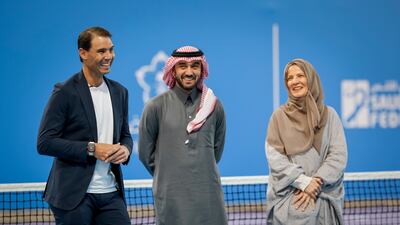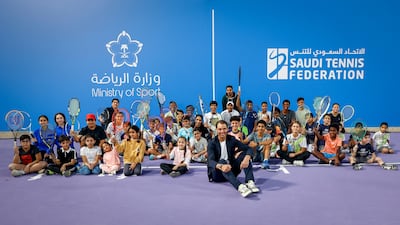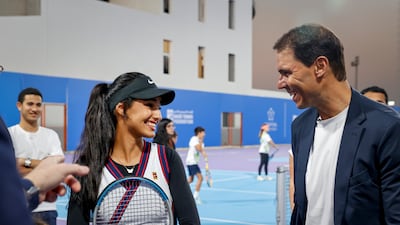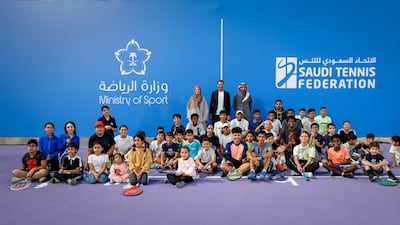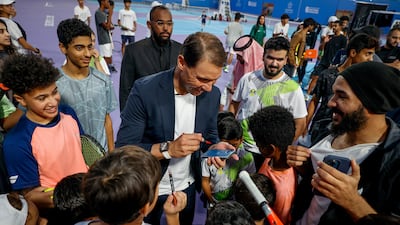Rafael Nadal's role in helping to grow tennis in the Gulf is set to increase significantly after the Spanish great was appointed ambassador of the Saudi Tennis Federation (STF).
As part of his new position, Nadal, who made a recent surprise visit to a junior tennis clinic in Riyadh hosted by the STF, will spend dedicated time in Saudi Arabia each year to help nurture and plan the development of boys and girls in the sport as well as grow further interest in tennis amongst the country’s young population.
Additionally, plans are also being put in place to develop a new Rafa Nadal Academy to nurture talent and serve as a centre of excellence to help players with professional tennis aspirations.
“Everywhere you look in Saudi Arabia, you can see growth and progress and I’m excited to be part of that," Nadal, 37, said. "I continue to play tennis as I love the game. But beyond playing I want to help the sport grow far and wide across the world and in Saudi there is real potential.
"The kids here today are looking to the future and have a real passion for all sports. If I can help them pick up a racquet or simply get fit and enjoy the benefits of healthy living, then I’ll be happy to have made a difference.”
Nadal, one of the greatest tennis players in history and winner of 22 Grand Slam titles, is set to support tennis in one of the fastest-growing countries in the world, with sport becoming an increasingly important part of daily life, especially for Saudi Arabia's 20 million people under 30 years old.
Under Vision 2030, sports participation across men and women in Saudi Arabia has rapidly increased and is now close to 50 per cent, more than tripling since 2015. The number of sports federations has also tripled during this time, with the STA an example of the progress being made.
In 2023 an estimated 30,000 children in the kingdom took their first steps in tennis thanks to the ‘Tennis For All’ programme – a partnership between the STF and Saudi Sports For All Federation, which saw tennis introduced to the physical education curriculum in 90 schools. Plans are already in place to roll the programme out in 200 schools in 2024 and 400 in 2025.
Saudi Arabia is currently home to 177 tennis clubs, up 146 per cent since 2019. In the last four years, the number of registered players has increased by 46 per cent to 2,300 and under-14 players by 100 per cent - from 500 to more than 1,000. STF also now holds 40 national tournaments annually – including three ITF Juniors tournaments in the past year.
“Rafa embodies all the values we hold dear in a true champion on and off the court," Saudi Tennis Federation president, Arij Almutabagani said. "He’s simply the ideal role model for our young boys and girls to look up to.









"It’s clear Rafa lives the best version of himself every single day. His dedication to training, his commitment to every shot and the way he fights for every point are values we hope to instill in our own future stars. Not just to develop them as players but as people.
“Rafa transcends the sport of tennis and continues to inspire generations around the world. I’ve no doubt he will have the same impact on Saudi. We feel blessed to call him our ambassador and our young players can’t wait to work with him.”
Nadal and his coaching team are also set to develop a programme of values to inspire ‘Team Saudi’, the national teams who represent the Saudi Olympic & Paralympic Committees in international tournaments, and will share their knowledge with all players and their coaches.
Under Vision 2030, Saudi Arabia's ongoing social and economic transformation, the country has hosted some of the biggest global sports events. Since 2018, the kingdom has staged over 85 international events for both male and female athletes including football, motorsports, tennis, equestrian, esports, golf, and boxing, attended by more than 2.6 million sports fans.

The latest addition, the Next Gen ATP Finals, signals Saudi Arabia's intent to make tennis a major part of its international calendar and is the first of many likely professional tennis tournaments to be held in the country.
Meanwhile, exhibition events have already been held in Saudi Arabia; last month the top two players in men's tennis, Novak Djokovic and Carlos Alcaraz, competed in the Riyadh Season Tennis Cup.
“Yes, we want to host the world’s best to inspire and help our young people fall in love with the game. But looking ahead one day we also want to play alongside and compete against the world’s best male and female players," Almutabagani said.
"We know it’s a long journey ahead but we’re investing in our children and committed for the long-term. And hopefully with Rafa’s support we’ll go along that journey a little bit faster and as a fit and healthy nation.”
Nadal has long played an active role in promoting tennis in the region, and his new role as an ambassador for the STF is sure to accelerate the sport's growth. The former world No 1 was a regular visitor to Abu Dhabi for the pre-season Mubadala World Tennis Championship, where he also led coaching clinics for children, while his famed Rafa Nadal Academy opened its second facility in Kuwait in 2020.
Nadal began his 2024 season in Australia after nearly 12 months sidelined with a hip injury, although his comeback was cut short due to a separate muscle injury and he was forced to miss the Australian Open.
